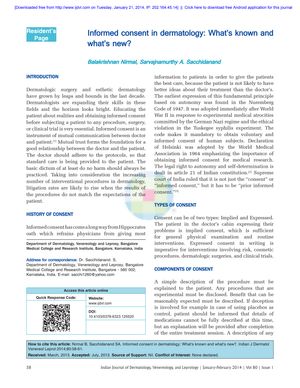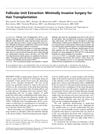Informed Consent in Dermatology: What's Known and What's New?
January 2014
in “
Indian Journal of Dermatology, Venereology and Leprology
”

TLDR The document concludes that clear communication and a strong doctor-patient relationship are essential for effective informed consent in dermatology.
The 2014 document highlights the critical role of informed consent in dermatology, focusing on surgical and esthetic procedures. It reviews the evolution of informed consent from its origins to current legal mandates, stressing the importance of clear communication and trust. The document details the types of consent, necessary components for obtaining consent, and the features that must be considered, such as the patient's age and language. It also addresses the significance of consent record-keeping, the potential benefits of using audiovisual aids for patient education, and the Indian Health Ministry's consideration of mandatory audio/video consent in clinical trials. Despite these measures, the document acknowledges that the certainty of consent's validity is often only determined through litigation, underscoring the importance of a strong doctor-patient relationship. A model consent form for hair transplantation is provided as an example of best practices in consent documentation.


